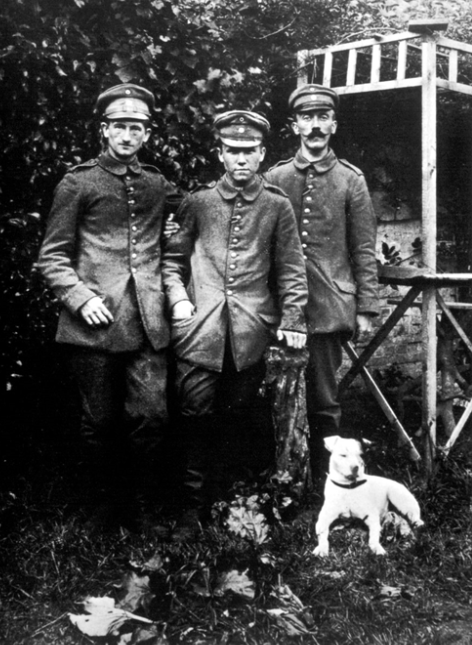I feel as though for most of us, we have a pretty good image of what comes to mind when someone says “Hitler”. We may see his face, hear his voice, or think of the Holocaust. Some may think of the story of him being rejected from art school. But to fully understand the intricacies of the Holocaust, one must understand who Adolf Hitler was and where his radical ideas stemmed from.
Very little is actually known about Hitler’s upbringing. He was born in Braunau, Austria, in 1889. He lost both of his parents at a very young age and never made it past a secondary education. After dropping out of school, he took money left to him by his father and moved to Vienna to pursue life as an artist. He made money through postcard and advertising commissions and drifted from hostel to hostel never really making true connections to anyone around him. He quickly developed a hatred for the egalitarian, multi nationalism of Vienna12.
In 1913 he moved to Munich. He volunteered for the Germany army and was deployed in October of 1914. He served throughout World War I, being hospitalized several times after being exposed to a British gas shell13 and being wounded by shrapnel14. He would be awarded with the Iron Cross, Second Class in 1914 and the Iron Cross, First Class in 1918 for his bravery and continuous fighting.
 15
15
After the war, Hitler found himself in a politically and socially chaotic Munich. Emboldened by Germany’s defeat, he began his career in politics through a position with the German Workers’ Party (DAP, short for Deutsche Arbeiterpartei) in 1919. Later renamed the National Socialist German Workers’ Party, the party’s platform was built on German nationalism, antisemitism, anti-capitalism, anti-Marxism, and the idea of Volksgemeinschaft (we’ll revisit this concept later). Hitler left the army and fully immersed himself in the DAP. He was put in charge of the party’s propaganda at a time when Germany was especially receptive. The resentment held towards the Weimar Republic and the terms of peace was only exacerbated by the economic frailty of Germany. This was especially true in Munich, a region that held a strong dislike of the democratic government in Berlin and was very favorable towards the segregation of true Germans and Slavic minorities. Munich was also a safe harbor for spiteful WWI soldiers and the homegrown paramilitary units. Hitler would later help to recruit these men for his “strong arm” squads to protect DAP meetings, attack communists and socialists, and incite violence as a means of flexing the Party’s strength and influence.
Hitler never considered his position within the DAP -now the Nazi Party - as permanent, but rather a stepping stone that could lead to something bigger. He knew the power of his position, and would often threaten to resign whenever he felt threatened by other party members. The traction of the Nazi Party quickly grew, and with it, the opportunity to seize power. The Nazi Party would attempt to overthrow the Weimar government in November of 1923 in the Munich Beer Hall (Putsch). This coup left four policemen dead, Hitler injured, and an undefeated Weimar Republic. He was charged with treason and sentenced to five years in prison. The failed attack on the beer hall allowed him an immense amount of publicity, but also revealed an important lesson: the Nazi Party needed to gain power through legal moves.
It was during this five year stint that Hitler would pen his infamous Mein Kampf, or My Struggle16. Mein Kampf would solidify his political ideologies and begin to illustrate his political goals. The book narrates the development of his antisemitism, militarism, and anti-communist beliefs. He blamed Germany’s issues on the democracy of the Weimar Republic, the Jews, socialists, and Marxists. He noted that the socialists and Marxists however, were all working for the interests of Jews. He went on to insinuate that if hundreds of thousands of these “Hebrew corrupters” had been exposed to the poison gas like the German soldiers had during WWI, then the millions “sacrificed” on the front would not have been in vain17.
He would go on to write about how revolting Vienna was with the integration of “Czechs, Poles, Hungarians, Ruthenians, Serbs, and Croats, and always [the] infection which dissolves human society, the Jew”. He would go on to describe his idea of Volksgemeinschaft -his radical version of ethnic nationalism that defined what the ideal German was. His political goals of German expansion were rooted in what he called Lebensraum. He did not long to regain control of the land Germany lost in World War I, but rather to take over territory to build a community of Volksgemeinschaft. Hitler would become Chancellor of Germany on January 30, 1933. He would become dictator in August of 1934. World War II would start with the invasion of Poland on September 1, 1939.